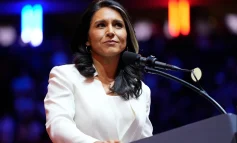
WASHINGTON (IPS) — Admiral William Fallon’s request to quit his position as head of the U.S. Central Command (CENTCOM) and to retire from the military was apparently the result of a George W. Bush administration decision to pressure him to resign.
Announcing the resignation, Defense Secretary Robert M. Gates said he believed it was “the right thing to do,” thus indicating the administration wanted it.
On Monday, Pentagon Press Secretary Geoff Morrell, asked whether Gates still had full confidence in Fallon, would only say that Fallon “still enjoys a working — a good working relationship with the secretary of defense,” and then added, “Admiral Fallon serves at the pleasure of the president.”
The resignation came a few days after the publication of an Esquire magazine article profiling Fallon in which he was described as being “in hot water” with the White House and justified public comments departing from the Bush administration’s policy toward Iran. The publicity that followed the article accelerated the pressure on Fallon to resign.
But Fallon almost certainly knew that he would be fired when he agreed to cooperate with the Esquire magazine profile in late 2006.
On Tuesday, Fallon issued a statement saying, “Recent press reports suggesting a disconnect between my views and the president’s policy objectives have become a distraction at a critical time and hamper efforts in the Centcom region.”
The resignation brings to an end a year, during which time Fallon clashed with the White House over policy toward Iran and with Gen. David Petraeus and the White House over whether Iraq should continue to be given priority over Afghanistan and Pakistan in U.S. policy.
Fallon’s greatest concern appears to have been preventing war with Iran. He was one a group of senior military officers, apparently including most of the Joint Chiefs of Staff, who were alarmed in late 2006 and early 2007 by indications that Bush and Vice-President Dick Cheney were contemplating a possible attack on Iran.
Gates chose Fallon to replace Gen. John P. Abizaid as CENTCOM chief shortly after a Dec. 13, 2006 meeting between Bush and the Joint Chiefs at which Bush reportedly asked their views on a possible strike against Iran.
Col. W. Patrick Lang, a former intelligence officer on the Middle East for the Defense Intelligence Agency, told the Washington Post last week that Fallon had said privately at the time of his confirmation that an attack on Iran “isn’t going to happen on my watch.” When asked how he could avoid such a conflict, Fallon reportedly responded, “I have options, you know.” Lang said he interpreted that comment as implying Fallon would step down rather than follow orders to carry out such an attack.
As IPS reported last May, Fallon was also quoted as saying privately at that time, “There are several of us trying to put the crazies back in the box.” That was an apparent reference to the opposition by the Joint Chiefs of Staff to an aggressive war against Iran.
Even before assuming his new post at CENTCOM, Fallon expressed strong opposition in mid-February to a proposal for sending a third U.S. aircraft carrier to the Arabian Gulf, to overlap with two other carriers, according to knowledgeable sources. The addition of a third carrier was to part of a broader strategy then being discussed at the Pentagon to intimidate Iran by making a series of military moves suggesting preparations for a military strike.
The plan for a third carrier task force in the Gulf was dropped after Fallon made his views known.
Fallon reportedly made his opposition to a strike against Iran known to the White House early on in his tenure, and his role as CENTCOM commander would have made it very difficult for the Bush administration to carry out a strike against Iran, because he controlled all ground, air and naval military access to the region.
But Fallon’s role in regional diplomacy proved to be an even greater source of friction with the White House than his position on military policy toward Iran. Personal relations with military and political leaders in the Middle East had already become nearly as important as military planning under Fallon’s predecessors at CENTCOM.
Fallon clearly relished his diplomatic role and did not hesitate to express views on diplomacy that were at odds with those of the administration. Last summer, as Dick Cheney was maneuvering within the administration to shift U.S. policy toward an attack on bases in Iran allegedly connected to anti-U.S. Shi’a forces in Iraq, Fallon declared in an interview, “We have to figure out a way to come to an arrangement” with Iran.
When Sunni Arab regimes in the Middle East became alarmed about the possibility of a U.S. war with Iran, Fallon made statements on three occasions in September and November ruling out a U.S. attack on Iran. Those statements contradicted the Bush administration’s policy of keeping the military option “on the table” and soured relations with the White House.
Fallon also antagonized administration officials by pushing for a faster exit from Iraq than the White House and Gen. Petraeus wanted. Fallon had a highly-publicized personal and policy clash with Petraeus, for whom he reportedly expressed a visceral dislike. Sources familiar with reports of his meetings with Petraeus in Baghdad last March told IPS last spring that he called him an “ass-kissing little chicken s**t” in their first meeting.
Fallon later denied that he had used such language, suggesting to Esquire that the sources of the report were probably army officers who were indulging in inter-service rivalry with the navy. In fact, however, the sources of the report were supporters of Fallon.
Fallon’s quarrel with Petraeus was also related to the latter’s insistence on keeping U.S. troops in Iraq, even while the NATO position in Afghanistan was growing more tenuous. Fallon was strongly committed to a strategy that gave priority to Afghanistan and Pakistan as the central security challenges to the United States in the Middle East and Asia.
Fallon made his distaste for a long war in Iraq very clear from the beginning. He ordered subordinates to stop using the term “long war,” which had been favored by the Bush administration. He was reported to be concerned that the concept would alienate people across the Middle East by suggesting a U.S. intention to maintain troops indefinitely in Muslim countries.
Fallon’s policy positions made him unpopular among neoconservative supporters of the administration. One neoconservative pundit, military specialist Max Boot, criticized Fallon last November for his public comment ruling out a strike against Iran and then suggested in January that Petraeus should replace the “unimpressive” Fallon at CENTCOM.
Fallon was playing a complex political game at CENTCOM by crossing the White House on the two most politically sensitive issues in Middle East policy. As a veteran bureaucratic infighter, he knew that he was politically vulnerable. Nevertheless, he chose late last year not to lower his profile but to raise it by cooperating fully with the Esquire article.
IPS has learned that Fallon agreed to sit for celebrity photographer Peter Yang at CENTCOM headquarters in Tampa Dec. 26 for the Esquire spread, despite the near-certainty that it would exacerbate his relations with the White House. That may have been a signal that he already knew that he would not be able to continue to play the game much longer and was ready to bring his stormy tenure at CENTCOM to an end.
Gareth Porter is an historian and national security policy analyst. The paperback edition of his latest book, “Perils of Dominance: Imbalance of Power and the Road to War in Vietnam,” was published in 2006.





Leave a Reply